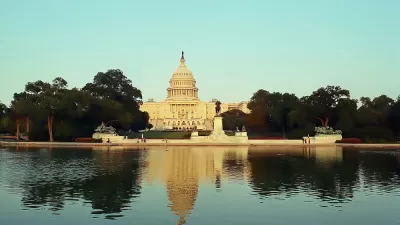Rep. Ted Poe (R – Texas) has introduced legislation that would gut the reach of the American Community Survey—one of the most useful sources of information for planning research.
Abigail Zenner reports that a recently proposed bill in Congress would threaten the collection of data vital to planning in the American Community Survey (ACS). According to Zenner, "Representative Ted Poe (R-Texas) introduced a bill (HR 2255) that would make all but four of the ACS survey questions voluntary."
Here's how Zenner explains the possible impact of the proposed federal legislation: "If the ACS loses its funding or is made voluntary, the survey would dramatically decline in participation rate. When Canada changed their similar annual survey from required to voluntary participation, the rate dropped from 94 percent to 69 percent. That drop increased survey costs since the government had to send out far more surveys to boost the sample size. Despite those efforts Canada’s survey could not produce reliable data for 25 percent of the nation."
The American Planning Association (APA) has already mobilized a response to the bill, gathering representatives from the U.S. Council of Mayors, International Council of Shopping Centers, Asian Americans Advancing Justice, and the Marketing Research Association to speak with congressional staff "about the importance of preserving the ACS and how that data is used for communities and business." The APA also joined 20 other organization, including the U.S. Chamber of Commerce, labor unions, and retail groups, in sending a letter to Congress explaining the importance of ACS.
FULL STORY: Congress puts the American Community Survey at risk

Alabama: Trump Terminates Settlements for Black Communities Harmed By Raw Sewage
Trump deemed the landmark civil rights agreement “illegal DEI and environmental justice policy.”

Planetizen Federal Action Tracker
A weekly monitor of how Trump’s orders and actions are impacting planners and planning in America.

The 120 Year Old Tiny Home Villages That Sheltered San Francisco’s Earthquake Refugees
More than a century ago, San Francisco mobilized to house thousands of residents displaced by the 1906 earthquake. Could their strategy offer a model for the present?

In Both Crashes and Crime, Public Transportation is Far Safer than Driving
Contrary to popular assumptions, public transportation has far lower crash and crime rates than automobile travel. For safer communities, improve and encourage transit travel.

Report: Zoning Reforms Should Complement Nashville’s Ambitious Transit Plan
Without reform, restrictive zoning codes will limit the impact of the city’s planned transit expansion and could exclude some of the residents who depend on transit the most.

Judge Orders Release of Frozen IRA, IIJA Funding
The decision is a victory for environmental groups who charged that freezing funds for critical infrastructure and disaster response programs caused “real and irreparable harm” to communities.
Urban Design for Planners 1: Software Tools
This six-course series explores essential urban design concepts using open source software and equips planners with the tools they need to participate fully in the urban design process.
Planning for Universal Design
Learn the tools for implementing Universal Design in planning regulations.
Clanton & Associates, Inc.
Jessamine County Fiscal Court
Institute for Housing and Urban Development Studies (IHS)
City of Grandview
Harvard GSD Executive Education
Toledo-Lucas County Plan Commissions
Salt Lake City
NYU Wagner Graduate School of Public Service




























